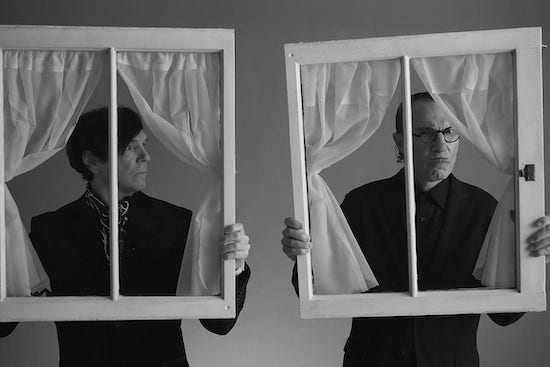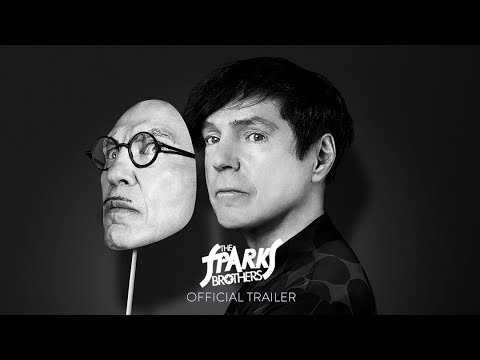“Making music documentaries was never on a checklist on my wall,” says Edgar Wright, the British filmmaker known for his fast-paced action films (Baby Driver) with great soundtracks (Scott Pilgrim vs the World) and a sideline in sharp, alternative comedy (Shaun of the Dead). “It was more that I thought Sparks deserved a film, and that I was aggrieved on their behalf that they didn’t have one.” What Wright didn’t realise at the time was that Sparks had hitherto turned down every offer they’d ever had to make a film about them.
In 2015, Wright was in Los Angeles writing Baby Driver, and it was whilst “evangelising” to a friend about his favourite band that he decided to see if they were on Twitter. “I assumed Sparks were too cool to be on Twitter,” he tells me over Zoom. Edgar and Russell Mael – the band’s lithe, stagy singer – quickly started exchanging DMs, and three days later, Wright was having breakfast in Ron Mael’s garden and pinching himself that “the world had suddenly become smaller”. This was the band he’d loved since the age of five, and now they were having breakfast.
Though Wright had not made a documentary before, the same thoughts kept pestering him: “I’d seen documentaries about artists who are way less prolific and influential than Sparks and they’d get the feature treatment! How come Sparks don’t have a documentary? What an amazing story it would be,” he kept telling himself. Whilst at one of their shows in L.A. in October 2017 with director Phil Lord, his friend turned to him and simply said: “You should do it.”
Thanks to the rapport Edgar had built up with his new friends Ron and Russell and, let’s not kid ourselves, the pedigree he has as a filmmaker, Sparks accepted when he offered to make their film. “I wanted to tell the whole story,” he adds, a prerequisite for Sparks. “I wasn’t going to ossify them as a ‘70s band. You and I who know about Sparks’ career know it’s an active, going concern. It’s the curse of TOTP2 or Glam Rock at the BBC; look at these ‘70s one-hit wonders… no, no, not a one-hit wonder.”
Wright’s enthusiasm for his subject is a boon for The Sparks Brothers documentary itself, which weighs in at two hours and 20 minutes but flies by. This is no doubt helped by Sparks’ incredible, genre-defying journey, which has taken in artpop, glam and alternative rock, opera, neoclassical and Giorgio Moroder-charged disco electronica. In the film, Vince Clarke and Andy Bell from Erasure freely admit it was Sparks who invented the energetic frontman / downcast keyboardist dynamic, which has become such a synthpop archetype.
Famous songs like ‘This Town Ain’t Big Enough For Both Of Us’ jostle with lesser known moments of brilliance such as ‘That’s Not Nastassia’ and ‘Girl From Germany’. Each of their 25 albums recorded over 50 years is covered, a dedication that matches the Maels’ own unfaltering and sometimes workmanlike dedication to their craft. Furthermore, the talking heads ensemble is a gloriously eclectic cast, featuring (and this is by no means exhaustive): Beck, Nick Rhodes and John Taylor from Duran Duran, Jonathan Ross, Jane Wieldin, Flea from Red Hot Chili Peppers, Gillian Gilbert and Stephen Morris from New Order, Mike Myers, Neil Gaiman, Alex Kapranos, Pamela Des Barres, Bjork, Thurston Moore and Rusty Egan. Also, many of the stars are not stars in their own right: “It was important to me to have an equivalence between Duran Duran and a lady that stage-invaded when she was 14,” says the self-confessed fanboy.
The Quietus: Did you feel the weight of responsibility on your shoulders? As the person who makes the film, you become the custodian of the image in a way, don’t you?
Edgar Wright: In terms of responsibility, of course, because you as a fan want to do right by them. The responsibility in a way is to tell the story for fans, but also introduce them to people who’ve never heard them before. But also to let them keep some enigma for themselves.
Was anything off limits?
They didn’t want to talk about their relationships, and I respect that. Their theory is that the drama is on the record. The reason Sparks are so well respected is that they let the works speak for themselves. Other bands, brother bands like Oasis – I feel the story of the infighting has started to overshadow the work. The first thing you think about Oasis now isn’t the hits anymore, it’s the fact they hate each other’s guts [laughs]. And it’s a shame for them – don’t let that be your legacy, let the music be the legacy. Sparks have gone the opposite way, as there are elements of their personal lives that they don’t think are important. They’ll say things on record that they would probably never vocalise in real life. The responsibility is how do you tell the story and let them remain a question mark as they would like it?
There are moments in the film that I didn’t know about, like that their beloved father died when they were still young. It might sound exploitative, but as a filmmaker, do you look for moments like that?
Yeah, some of the best moments in the film are where the decorum of a diplomatic interview breaks down. One of my favourite things in the whole documentary… Ron and Russell said the only thing that was off the table was that they didn’t want to talk about relationships. I said fine, but then Todd Rundgen and Earl Manky both mentioned that Todd and Russell were dating the same woman at one time. So then Russell is giving this diplomatic answer and he says, “Well, we became friends with Miss Christine”, and as he’s talking, you can see Ron start to smirk and he says, “We did?” The fact they let me keep that in was great.
They’re quite an inscrutable pair, aren’t they?
I think it’s great that they’ve sort of trained themselves to be inscrutable and it’s well within their rights to do that. I’m friends with Joanna Newsom, through Andy Samberg, and I remember her saying, “Oh, my record label really wants me to be on social media and I don’t want to do it.” I said, “Would Kate Bush be on social media?” She goes, “No”. So there you go! It’s that weird thing where people think you’re not allowed to be enigmatic anymore.
I decided to interview Ron and Russell in a two-shot for nearly all of it, and then finally I said to them, ‘I want to interview you both separately for 90 minutes’. And that’s where you get stuff where Ron says, ‘I can’t do this without Russell, just the thought of doing this on my own, I can’t even conceive it’. It’s really nice to get them separately saying, ‘I can’t do what the other one can’. I thought that was really sweet.
Their genius is symbiotic, isn’t it?
Yeah, and I think the thing about Ron and Russell is that they have such a respect for each other and what the other one does, and the knowledge that they cannot do what the other one does and neither do they want to. It’s why they’ve been going for 50 years and it’s amazing.
Was it difficult leaving things out? There are so many stories concerning all sorts of people: Brian May, Mick Ronson, Morrissey…
I decided that if you didn’t have the person talking themselves, it wasn’t worth talking about second hand. I nearly got Brian May on board but it didn’t work out scheduling wise. He was willing to talk about them trying to poach him from Queen. Obviously Mick Ronson is no longer with us and Morrissey is elusive in a different way [laughs]. Sparks were known for being Morrissey’s favourite band, and in a weird way it was nice to remind people that there are all these other bands that would go on record to say that Sparks were an influence, some of which had never done that in an interview before.
A very sweet thing: I was in London recording Stephen and Gillian from New Order and they’d never met Ron and Russell. And then they both separately did the same thing. Stephen and Gillian said, ‘Hey, is it okay if we stay on a little bit longer and say hello to Ron and Russell?’ And Ron and Russell both said, ‘Hey, is it okay if we come in a bit earlier to meet Stephen and Gillian?’ So in this studio canteen in Islington I got to witness Sparks and New Order meeting for the first time and it was just a beautiful thing to witness if you’re a music fan.
Is there an underlying message? Maybe: keep going and you’ll be moderately successful?
Here’s the thing, I think people take away from it that keeping true and having the determination to keep to your own beliefs is alway the best way to go, even if you’re pushing through indifference. You can speculate on whether they would be bigger if they sold out, or whether they would have completely disbanded. We’ll never know, but the truth of the matter is, Ron and Russell aren’t unsuccessful because they’re successful in themselves. And if anything, hopefully the message you get from the documentary is: how do you measure success? Because in many ways, Sparks are a very successful band – just not by the metrics that bands are supposed to be measured. Is it about sales, or stadium gigs, or the output? In this case, the legacy that they leave behind is extraordinary, and they haven’t finished yet.



